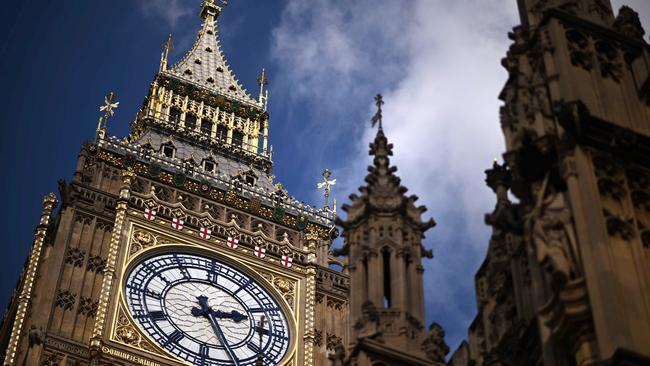UK market turbulence is latest challenge for British businesses
Executives feel buffeted by market crises, from Brexit, through the pandemic and the present currency and bond turmoil.

For British companies, the recent volatility in domestic currency and bond markets is compounding six years of extreme disruptions, starting with Brexit and stretching through the pandemic and the fallout from Russia’s war in Ukraine.
Executives say the recent market turmoil has dealt another blow to already fragile business confidence, threatening to crimp future investment and undermine growth in the world’s fifth-largest economy. Late last week, the government unveiled a deep tax-cutting plan that surprised markets – sending the UK currency briefly to an all-time low against the dollar and jacking up yields on government debt. The currency has since mostly recovered, but the higher yields threaten to lift borrowing broadly for businesses and consumers alike.
“It’s a never ending roller coaster, but there is never an up part,” said Andrew Murray-Watson, co-founder of closely held, London-based drinks company Brixton Gin. “The hardest thing for any business to deal with is uncertainty.” He has been struggling most recently with the soaring prices of raw materials, which have risen 40 per cent this year, he said. Inflation is climbing in most big markets, but the UK has so far racked up one of the highest among the world’s richest countries. As a result of all the new uncertainty, Mr Murray-Watson said the gin maker was likely to put investments on hold for the next 12 months.
Sentiment among businesses was low before the government’s announcement and the market reaction. Business confidence for September was well below the long-term average and the lowest level since March 2021, when the economy emerged from a wave of Covid-19, according to a survey by UK lender Lloyds Bank.
Meanwhile, the level of business investment in the second quarter was 5.7 per cent below where it was in the final quarter of 2019, just before the pandemic, and 7.4 per cent below where it was before the Brexit vote, according to the Office for National Statistics.
The UK economy is forecast to record zero growth next year, according to the Organisation for Economic Cooperation and Development, the third-lowest rate in the Group of 20 leading economies after Russia and Germany.
Amid the litany of challenges, shares in British companies have broadly underperformed peers in Europe and the US in recent years. The FTSE 250, an index that includes mainly British midcap companies, has gained 3.75 per cent since the June 2016 Brexit vote and offered a total shareholder return, which includes dividends, of 19.86 per cent over that period. The MSCI Europe Mid Cap, an index that measures companies of a comparable size across the continent, is up 11.5 per cent, with a return of 36 per cent. The S&P midcap 400 is up 48 per cent and returned 63.41 per cent.
British businesses were divided about Britain’s 2016 referendum to leave the EU. The vote to split sent the pound sharply lower, a descent from which it never fully recovered. That contributed to higher costs for importers.
After the divorce took place on Dec. 31, 2020, many businesses have complained about increased paperwork and costs associated with trading with the bloc, and cite the reduced availability of foreign workers. Brexit supporters say the split will eventually boost prospects by lowering regulatory hurdles and allowing Britain to set its own trade policies.
The pandemic, meanwhile, was particularly painful in the UK, whose services-weighted economy was hit by lockdowns. More recently, the war in Ukraine has sent energy and food prices soaring.
JD Wetherspoon, one of Britain’s largest pub chains, recently said it planned to sell 32 pubs amid deteriorating sales. “’The multiplying villainies of nature do swarm upon us,’ as Shakespeare once said,” said Tim Martin, the company’s founder and chief executive, and one of the most outspoken Brexit proponents among UK business.
“That’s what it feels like,” he said in a text, responding to a question about the yearslong trouble for British business.
The UK government says its fiscal plans will help boost growth. Many companies say they are unconvinced. Top business figures including the chief executive of Virgin Atlantic Airways and the chairman of grocery giant Asda Stores Ltd. have criticised the move in recent days.
For Nimisha Raja, the CEO of Nim’s Fruit Ltd., many of the difficulties of doing business in Britain started with Brexit. The move hurt sterling, increasing the cost of importing fruit, and introduced paperwork that means some sales to the bloc are no longer worth the effort.
In the past year, Nim’s Fruit, which makes snacks made of dried fruits and vegetables, has also been hit by higher energy costs. The company’s natural-gas bill has jumped to GBP7,500, equivalent to $US8,293, a month from about GBP2,500 a month last fall. It went as high as GBP18,000 each of four months straight. Now, the company’s borrowing costs are rising, too. The central bank has been raising interest rates to tackle inflation, but the sharp sell-off in UK government bonds in the wake of the tax-cut announcement threaten to pressure rates higher more generally.
Ms Raja says Nim’s Fruit is putting expansion plans on hold until it gets more certainty for planning. “Growth requires investment, and right now we are holding on tight to our purse strings,” Ms. Raja said.
While a weaker pound makes British exports more competitive abroad and foreign revenues more lucrative, many businesses here are reliant on foreign inputs that become more expensive.
Aston Martin Lagonda Global Holdings, the iconic British car maker, is a case study in that Catch-22. It exported around 82 per cent of its vehicles in the first half of this year, 27 per cent to the US, according to the company. The 20 per cent fall in the pound against the US dollar boosts the pretax profit on a $US170,000 sports car sold in New York when converted back into pounds. But 71 per cent of the manufacturer’s suppliers are based abroad, mainly in Europe, meaning the pound’s decline increases its costs.
Aston Martin said “the company has considerable cash flow, revenue and assets in foreign currencies and seeks to manage currency risk through hedging where feasible.” Julian Abel said his business, The Nowt Poncy Food Co., has stopped making detailed business plans because conditions are changing daily. The company, which makes curry sauces, wants to install new semi-automated production. Aside from its cost, it would need new staff at a time when wage demands are rising with the increase in the cost of living.
“We’re in survival mode here,” Mr Abel said, “keeping costs as low as we can and just ticking over sales-wise.”
The Wall Street Journal



To join the conversation, please log in. Don't have an account? Register
Join the conversation, you are commenting as Logout